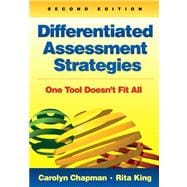
Note: Supplemental materials are not guaranteed with Rental or Used book purchases.
Purchase Benefits
What is included with this book?
| Preface | p. ix |
| Acknowledgments | p. xiii |
| About the Authors | p. xv |
| One Tool Doesn't Fit All: Introduction | p. 1 |
| What Is Differentiated Assessment? | p. 1 |
| Analyzing Your View of Differentiated Assessment | p. 5 |
| Building the Toolbox to "Zap the Gaps" | p. 6 |
| Assessment in the Age of Accountability | p. 6 |
| What Is the Teacher's Role in Differentiated Assessment? | p. 11 |
| Opening the Toolbox | p. 13 |
| p. 15 | |
| Processing Information and Memory | p. 15 |
| Why Students Forget and Why They Remember | p. 16 |
| Assist the Brain in Memory Processing | p. 18 |
| Develop Intelligent Behaviors for Assessment | p. 20 |
| Authentic Assessment | p. 23 |
| Performance Feedback | p. 24 |
| Summary | p. 24 |
| Creating a Climate for Formative Assessment | p. 25 |
| The Affective Domain and Assessment | p. 25 |
| Emotions | p. 26 |
| Emotional Intelligence | p. 26 |
| Self-Efficacy | p. 28 |
| Motivation for Assessment | p. 29 |
| The Physical Environment | p. 32 |
| Setting Climate Goals | p. 35 |
| Summary | p. 38 |
| Knowing the Learner | p. 39 |
| Information Gathering | p. 39 |
| Gardner's Multiple Intelligence Theory | p. 42 |
| Exploring Goleman and Sternberg | p. 47 |
| Through Animals' Eyes | p. 48 |
| True Colors Through Objects | p. 48 |
| Assessing Students' Perceptual Styles | p. 50 |
| Engaging Learner Views | p. 54 |
| Performance Level Titles for the Assessed Learner | p. 56 |
| Summary | p. 57 |
| Exploring Self-Assessment | p. 59 |
| What Is Self-Assessment? | p. 59 |
| What Is Self-Talk? | p. 59 |
| What Is the Role of Self-Talk in Self-Assessment? | p. 59 |
| Productive Metacognitive Conditions | p. 60 |
| Self-Talk for Task Assessment | p. 61 |
| Teaching Self-Assessment | p. 63 |
| Self-Checking Techniques for Assessment | p. 64 |
| Assess On-Task Behaviors | p. 67 |
| Summary | p. 67 |
| Formative Assessment Before the Learning | p. 69 |
| Personalize Instructional Planning | p. 71 |
| Engaging Students Before the Learning | p. 72 |
| Summary | p. 82 |
| Formative Assessment During the Learning | p. 83 |
| Formative Assessment Tools to Use During the Learning | p. 83 |
| Summary | p. 92 |
| Formative Assessment After the Learning | p. 93 |
| Student Engagement After the Learning | p. 93 |
| Assessment Tools: After the Learning | p. 94 |
| Bloom's Taxonomy for Comprehension Assessment | p. 95 |
| Summary | p. 122 |
| Differentiating Summative Assessments | p. 123 |
| How Can Standardized Assessments Be Differentiated? | p. 123 |
| Create a Positive Testing Environment | p. 125 |
| Give Effective Directions | p. 125 |
| Teach Test-Taking Skills | p. 126 |
| Grading | p. 127 |
| Summary | p. 129 |
| Assessment for Differentiated Instruction and Flexible Grouping | p. 131 |
| Using Technology for Assessment | p. 131 |
| Assessment Cubing | p. 133 |
| Choice Boards | p. 134 |
| Assessment Agendas | p. 136 |
| Stations, Centers, and Learning Zones for Assessment | p. 138 |
| Assessment for Flexible Grouping | p. 140 |
| Evaluating Group Work | p. 146 |
| Group Discussion: Assessment | p. 149 |
| Troubleshooting Tools for Group Assessment | p. 152 |
| Summary | p. 153 |
| Differentiated Instructional Planning Models | p. 155 |
| Adjustable Assignment Model | p. 155 |
| Curriculum Compacting Model | p. 163 |
| Academic Contract Model | p. 166 |
| Project-Based Model | p. 168 |
| Problem-Based Model | p. 171 |
| Summary | p. 172 |
| Planning for Differentiated Assessment | p. 173 |
| Step Up to Formative Assessment Planning | p. 173 |
| Content, Process, Product, and Learning Disposition Assessment | p. 177 |
| The Role of Formative Assessment in Curriculum Planning | p. 179 |
| Essential Questions for Planning | p. 182 |
| Teaching Assessment Strategies | p. 183 |
| Effective Differentiated Assessment Practices | p. 184 |
| Generate Change for Differentiated Formative Assessment | p. 187 |
| Summary | p. 187 |
| Bibliography | p. 193 |
| Index | p. 195 |
| Table of Contents provided by Ingram. All Rights Reserved. |
The New copy of this book will include any supplemental materials advertised. Please check the title of the book to determine if it should include any access cards, study guides, lab manuals, CDs, etc.
The Used, Rental and eBook copies of this book are not guaranteed to include any supplemental materials. Typically, only the book itself is included. This is true even if the title states it includes any access cards, study guides, lab manuals, CDs, etc.